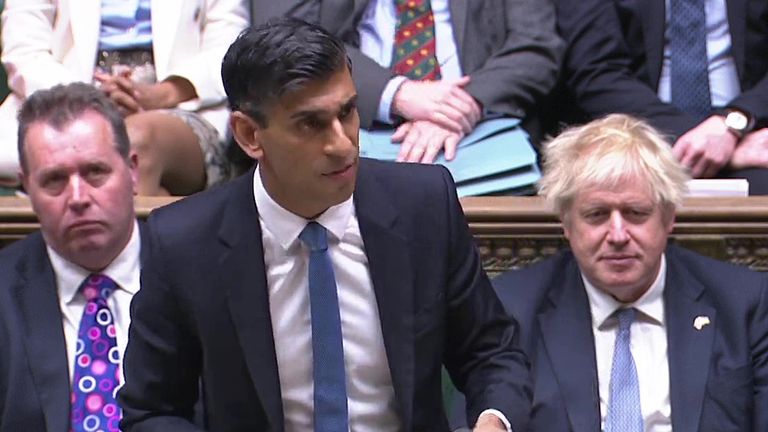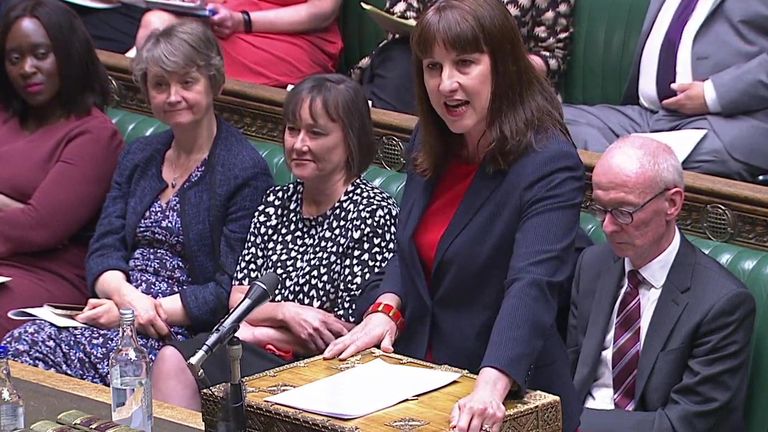If it looks like a duck, it’s a duck! Why Rishi Sunak’s windfall tax is facing a backlash
The chancellor may claim that a ‘temporary Energy Profits Levy’ is not a windfall tax but, as the popular saying goes, if it looks like a duck, quacks like a duck and waddles like a duck, then it probably is a duck.
The peculiar use of terminology is an attempt to disguise that this windfall tax – let’s call it what it is – represents a significant victory for the Labour Party and the Liberal Democrats. Both first came up with this policy and Rishi Sunak has purloined it.
The self-styled ‘low tax Chancellor’ has just slapped a combined rate of taxes on UK oil and gas profits to 65%.
Rishi Sunak goes further than expected – follow live cost of living updates
In doing so, Mr Sunak sought to confront those critics on his own benches that windfall taxes are ‘unconservative’ by highlighting similar measures in the past by Margaret Thatcher and George Osborne.
This was disingenuous.
Mrs Thatcher’s windfall tax on the banks in 1981 – imposed by her chancellor at the time, Sir Geoffrey Howe – was imposed specifically because the banks were benefiting from a government policy.
Sir Geoffrey had raised interest rates – in those days this was done by the government and not the Bank of England – which would directly have inflated the profits of lenders. Sir Geoffrey was giving with one hand and taking from the other.
Mr Sunak is just taking. Moreover, both Sir Geoffrey and Mr Osborne were committed to cutting taxes for businesses. Mr Sunak is just about to raise taxes on businesses.
The big question – and one that is almost impossible to answer – is the impact that this will have on investment.
But the UK’s offshore oil and gas industry, already the UK’s most heavily taxed business sector, says there will inevitably be an impact on investment and employment.
Deirdre Michie, chief executive of the industry body Offshore Energies, told Sky News: “Previous windfall taxes, we can point to the data, that it does undermine investment.
“And at a time when the country needs to really focus on its security of energy supply and the energy transition, we have been arguing for stability and predictability in terms of the fiscal regime, that is working, it is generating significant returns for the Treasury that they can then use to address the consumer crisis, but at the same time can give the kind of investor confidence that is needed to keep investing in oil and gas and underpin the energy transition.”
Ms Michie pointed out that the recent increases in profits come on the back of two years of significant losses in the sector – which supports 200,000 well-paid jobs – just as it had come through the previous downturn.
She added: “There are swings and roundabouts in this sector, we know that, which is why this change by the government, having the rules of the game changed by the government…could be a step backwards for the sector.
“Historically when this has happened, it doesn’t work, it undermines investment and, for the last almost 10 years, we have had fiscal predictability and stability which has brought investment back into the basin.”
She said that, unless new investments were made now, oil and gas production in the North Sea would “drop off a cliff” by 2030.
What will particularly concern businesses is the peculiarly open-ended nature of this windfall tax.
Mr Sunak said that, if oil and gas prices return to “historically more normal levels”, then the tax would be phased out. But those words “historically more normal” are doing a lot of work there.
If the Chancellor knows what “historically more normal levels” of oil and gas prices are, he certainly isn’t saying. The only certainty is that the legislation will be phased out at the end of December 2025 – so potentially this tax is going to be in place, potentially stymying investment, for the next three and a half years.
Equally alarming, from the view of business, will be the chancellor’s revelation that he is considering “appropriate steps” to target “extraordinary profits” being made by electricity generating companies.
That he was unable to come up with details on this point rather points to the complicated nature of these businesses.
The industry can argue, reasonably, that, because of hedging strategies, it is not enjoying windfall profits in any case.
The chart showing ‘spot’ energy prices may point to a dramatic increase in prices but most of the electricity generators sell their output under longer-term prices that will inevitably be lower than the ‘spot’ price.
There may well not be any windfall profits for Mr Sunak to tax. And establishing what windfall profits there may be to tax will probably require a horrendously complicated process in which the generating companies are required to open up their books so HM Revenue & Customs can establish for itself the prices being achieved by them. That could take months.
The chancellor will argue he is mitigating the impact of a windfall tax by introducing what looks, on the face of it, to be quite generous investment incentives with a new ‘super deduction’ type of relief.
The Treasury said: “The new Investment Allowance, similar in style to the super-deduction, incentivises companies to invest through saving them 91p for every £1 they invest. This nearly doubles the tax relief available and means the more a company invests, the less tax they will pay.”
Yet this may be less of an incentive to invest than Mr Sunak thinks. The big global oil players which have operations in the North Sea, such as BP, Shell and Total of France, have many different investment projects to choose from around the world when they decide how to deploy their capital.
Mr Sunak is, very crudely speaking, telling these companies that, if they invest more in the UK, they will pay less taxes.
But very few chief executives in any company, not just the oil and gas sector, would want to be told by any government how to deploy their capital. The oil and gas companies may take the view that, even with these incentives in place, they can invest their money more profitably elsewhere – particularly given the relatively high costs of North Sea exploration and production and the risk of another oil price crash at some point in future.
They may just assume it will be less hassle to take a financial hit from Mr Sunak in the short term.
And it may turn out to be even worse than that: the independent Institute for Fiscal Studies pointed out that investing £100 in the North Sea, with Mr Sunak’s new allowance, will cost companies only £8.75.
IFS economist Stuart Adam added: “A massively loss-making investment could still be profitable after tax. It is hard to see why the government should provide such huge tax subsidies and thereby incentivise even economically unviable projects.”
Quite. This policy lash-up could lead to a colossally inefficient misallocation of resources and capital.
As important in today’s statement was what Mr Sunak did not say. High energy prices do not only hurt households – they also hurt businesses. However, as Mr Sunak flung around with gay abandon his billions to support households, there was nothing to support businesses – many of which are being pushed to the brink by higher energy bills.
The Chancellor’s supporters will argue, as they seek to defend this impost, that only a handful of companies will end up paying it. The Treasury said today that, in recent years, fewer than 35 companies have made tax payments under the last windfall tax slapped on the sector – the ‘supplementary charge’ introduced by Gordon Brown in 2002 and raised by George Osborne in 2015 – and the top seven of these made 95% of payments.
Look, they will argue, at the share price reactions in BP and Shell – both of whose share prices rose by 1% this afternoon.
That, though, is not the place to look. Those are global companies for whom the North Sea is a very small part of their overall operations.
Instead, look at companies like Enquest, a player whose operations are focused on the North Sea and whose shares fell by more than 8%, or its peer Energean, down 2%. Or look at the electricity generating companies, still unclear on how much they will pay, with SSE down 4% and Drax down nearly 3%.
One final point is also worth bearing in mind about today’s announcements.
Mr Sunak’s giveaways are likely to add to inflation, as the consultancy Capital Economics noted: “The chancellor’s actions are adding to the already intensive inflationary pressure. Other things being equal, this loosening in fiscal policy means that to bring down inflation to the 2% target, monetary policy will need to be tighter.
“This supports our view that the Bank of England will have to raise interest rates from 1% now to 3% next year.”
Still, what is a punishing tax on a strategically important industry and a giveaway likely to stoke up inflation, when set against getting parties during lockdowns off the front pages?
Quack quack!





